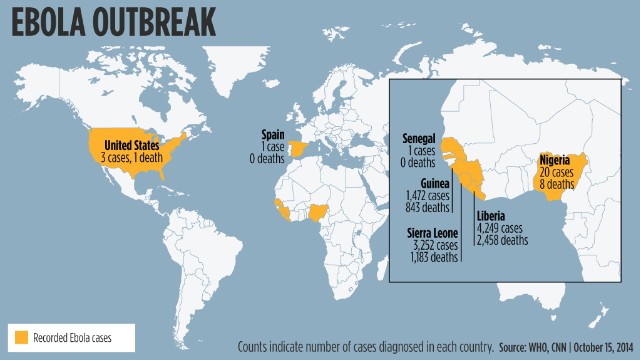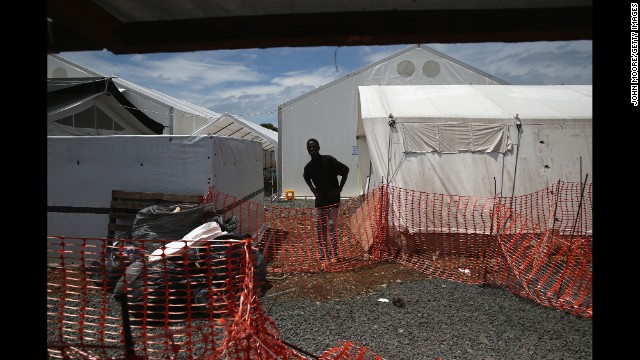Spain ramps up Ebola response; Norwegian tests positive in Sierra Leone
By Laura Smith-Spark and Al Goodman, CNN
October 7, 2014 — Updated 1636 GMT (0036 HKT)
Madrid (CNN) — Spanish health authorities said Tuesday they are monitoring three more potential cases of Ebola in Spain, a day after a nurse’s assistant became the first person known to have contracted Ebola outside of Africa in the current outbreak.
The woman helped treat two Spanish missionaries, both of whom had contracted Ebola in West Africa, one in Liberia and the other in Sierra Leone. Both died after returning to Spain.
READ: Spain has outbreak’s 1st known case of contracting Ebola outside of Africa
The developments in Spain come just as the organization Medecins Sans Frontieres (Doctors Without Borders) reports that a Norwegian staff member has contracted the deadly virus. The staffer had been working in the Sierra Leone city of Bo and was placed in isolation Sunday after developing a fever, the organization said Tuesday.
The worker is being sent to a treatment center in Europe.
In Spain, no details have yet been given of exactly how the nurse’s assistant contracted the virus, and her current condition is unknown.
Francisco Arnalis, head of internal medicine at the Carlos III Hospital, told a news conference that the three other potential Ebola cases are being monitored there.
One is the assistant’s husband, who faces a high risk of infection and had no protection. Another is a suspected case in a man who traveled overseas, has tested negative once and is awaiting a second test Wednesday.
The third, a nurse, is not a suspected case but has been brought in as a precaution after suffering diarrhea. She was exposed, but she was wearing protective gear, Arnalis said.
Another 22 contacts with the nurse’s assistant outside the Carlos III Hospital are also being monitored, the head of the hospital said Tuesday.

Recorded cases of Ebola
The hospital will not release information about the status of the nurse’s assistant, who has not been named, in order to respect her privacy, director Rafael Santamaria said.
The hospital has two potential treatments at its disposal, said Dr. Jose Ramon Arribas, one using an IV drip with the antibodies of Ebola survivors and the other an antiviral drug.
“This is a treatment that the WHO (World Health Organization) has recommended, even though they haven’t verified its efficacy,” he said of the IV drip.
EU: We need to know what happened
Spanish authorities have said that all the proper protocols and procedures were followed in the care of the two missionaries. But the European Union has asked for an explanation as to how the woman was infected.
European Commission spokesman Frederic Vincent told CNN on Tuesday that “Spain told us all the protocols have been followed, but obviously something wrong happened.”
There have been 10 evacuations of Ebola-infected patients from Africa to Europe, eight of those within the European Union, Vincent said — and it is first time that something like this has happened.

Photos: Ebola outbreak in West Africa
New Ebola screening protocols in the U.S.
“The hospitals where the patients are being taken are supposed to be equipped and ready to deal with Ebola patients,” he said.
“If protocols are being followed, it’s highly unlikely that an outbreak could happen in the EU. But again, zero risk doesn’t exist, particularly in a hospital, where staff deal with sick people.
“We need to find out as soon as possible what happened and if we need to revise procedures.”
There will be an extra meeting of European officials to discuss the Spanish Ebola case Wednesday, he said.
The World Health Organization said it was “ready to provide support to Spain, as and if required,” as it investigates the case and traces the infected woman’s contacts.
Unions question equipment used
Some Spanish unions have blamed the government, saying they warned it that the personal protective equipment used by the medical team was not of the highest standard.
And angry doctors and nurses outside the Carlos III Hospital where the nurse’s assistant is being treated — and where the two missionaries were cared for before her — said they were outraged the pair had been brought to the hospital, one in August and the other in September.
READ: Ebola drugs in the works
They said that the two priests, Miguel Pajares and Manuel Garcia Viejo, were almost dead when they arrived, and that they should not have been brought back to Spain, thereby putting other people’s lives at risk.
Spanish Health Minister Ana Mato announced Monday that testing had confirmed the nurse’s assistant has the virus.
The husband of the nurse’s assistant, who is under observation, is not sick, a spokesman for the Health Ministry said. It was not clear whether he is under quarantine. The couple have no children.
The assistant was one of about 30 health professionals in Spain who helped to treat the Ebola patients. They and the ambulance team that took her to the hospital are now reportedly under observation.
No word on where she took her vacation
Health officials said the assistant developed symptoms on September 30. She was not hospitalized until this week, when her only symptom was a fever.
She was first taken to a hospital in southern Madrid before being transferred to Carlos III Hospital, where she had helped care for the Ebola patients.
The second of the missionaries died on September 26, and she went on vacation a day later, health officials said. They have not said where that vacation was taken.
A few days later, she reported that she was not feeling well but her temperatures were not very high, officials said. It was only several days later that her temperature soared and she was hospitalized.
An investigation is underway to find everyone the assistant may have had contact with while infectious. So far, there are no other known related cases.
Health authorities have urged people to stay calm, as they hope that the virus’ spread is contained.
“We are working in coordination to give the best care to the patient and to guarantee the safety of all citizens,” said Mato, the health minister.
Obama: Top national security priority
The news came amid growing fears in the United States that the disease could spread.
“As I’ve said from the start of this outbreak, I consider this a top national security priority. This is not just a matter of charity. … This is an issue about our safety,” President Barack Obama told reporters Monday.
He called for protocols to help stop the spread of the disease, including additional air passenger screening, while downplaying the risk of an epidemic in the United States.
READ: In Liberia, Ebola is killing Thomas Duncan’s neighbors
Ebola has killed more than 3,400 people in West Africa, with more than 7,400 suspected, probable and confirmed cases.
The virus is transmitted through close and direct physical contact with infected bodily fluids, the most infectious being blood, feces and vomit. The incubation period, from the time of infection to symptoms, is two to 21 days.
CNN’s Al Goodman reported from Madrid, and Laura Smith-Spark wrote in London. CNN’s Laura Perez Maestro, Marilia Brocchetto and Nick Thompson contributed to this report.


